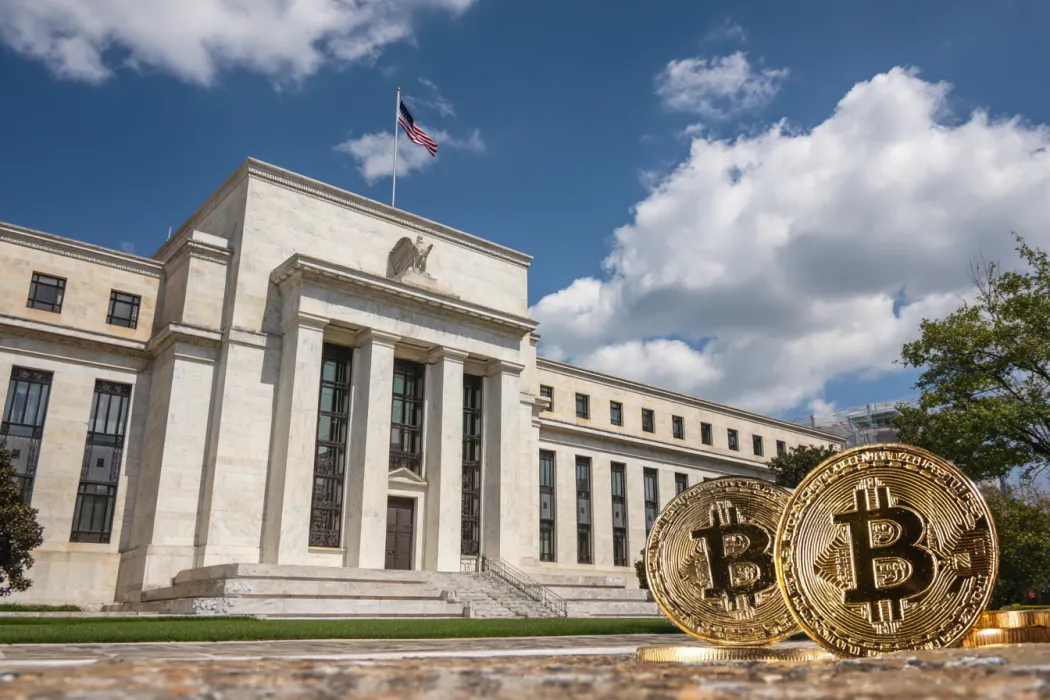Federal Reserve Confirms Crypto Embrace at Conference



The U.S. Federal Reserve held a groundbreaking conference on payments innovation on Tuesday, as cryptocurrencies made history by being officially included on the central bank's single-point agenda for the first time.
The single-day Federal Reserve's Payments and Digital Asset Innovation Conference hosted representatives from major crypto and digital assets companies.
Economists, technologists, and lawmakers gathered at the event to discuss how money and digital payments are evolving. On the panels were representatives from various blockchain and stablecoin companies, such as Chainlink, Paxos, Circle, and Coinbase.
Opening Remarks: Innovation Meets Regulation
The conference started with opening remarks from Federal Reserve Governor Christopher J. Waller .
The discussions revolved around the integration of conventional finance with the digital asset landscape, applications of stablecoins, the role of AI in payment systems, and the emergence of tokenized products.
The conference also sought to explore a diverse array of viewpoints on enhancing the payment system and promoting innovation.
Waller, in his introductory remarks, stressed the need to use cryptos and decentralized finance (DeFi) developments in the larger payments ecosystem. The Fed governor said, "The revolution transforming payments is demanding change everywhere."
Waller outlined a dual approach: fostering innovation led by the private sector alongside the creation of specific public infrastructure aimed at bolstering payment systems' robustness and effectiveness.
He also emphasized the Fed’s eye on tokenization, smart contracts, and AI in payments, indicating an increasing openness to trial innovative financial technologies.
Waller concluded his comments by proposing a new framework for "payment accounts" aimed at enhancing the adaptability of progressive financial institutions.
Bridging Finance: The Interoperability Challenge
At the first panel discussion, Chainlink co-founder and CEO Sergey Nazarov highlighted the ongoing issues related to the compatibility and integration of existing financial networks.
Nazarov said that within the next two to five years, a hybrid model that combines the present financial infrastructure with improved regulatory standards is anticipated to emerge.
He also identified the major challenges as the frameworks of compliance, identity verification, accounting, and regulation.
On the other hand, Lead Bank CEO Jackie Reses warned that most financial institutions lack the necessary resources to effectively oversee the merging of analogue and digital systems.
She stressed that enterprises should prioritize bitcoin on-ramps and off-ramps, transaction processing, and wallet infrastructure.
According to Reses, retail users still face restrictions on access, even though KYC-compliant systems are mostly built for institutional purposes.
She added that, rather than being planned centrally, stablecoin infrastructure will grow naturally in reaction to market need.
All the speakers agreed that the Fed needs to fix the infrastructure issues, provide digital assets with some clear rules to follow, and deal with the growing problem of fraud driven by AI.
Chainlink's Nazarov stressed the need for the Fed to integrate stablecoins and tokenized deposits into its existing systems to improve compatibility or integration. He said, "The payment landscape represents the buy side of the digital asset economy."
Lead Bank's Reses warned that safety should never be sacrificed for innovation. She emphasized that a lack of effective management of "AI fraud reversibility" and deepfake frauds might undermine trust. "It's always going to be great, until everybody's grandma is defrauded," Reses said.
The CEO of Fireblocks, Michael Shaulov, stressed this issue, drawing attention to the effect stablecoins have on the credit markets economically. More research into the effects of digital assets on bank balance sheets and the Fed's monetary policy function is required, he said.
Global head of treasury services at BNY, Jennifer Barker, highlighted key areas for regulators to focus on: updating payment systems for continuous operation, creating liquidity and redemption frameworks for tokenized deposits and stablecoins, improving fraud detection measures, and establishing technical standards.
Stablecoins and DeFi: Still Early Days
The stablecoin panel included Charles Cascarilla from Paxos, Tim Spence from Fifth Third Bank, Fernando Terres from DollarApp, and Heath Tarbert from Circle and was presided over by Kyle Samani of Multicoin Capital.
Paxos CEO Charles Cascarilla emphasizes that decentralized finance (DeFi) and crypto have significant progress to make before achieving genuine user-friendliness.
On the existing landscape of the industry, Terres said the experience of engaging with DeFi today was similar to the early days of the internet, when one had to connect via dial-up.
Paxos CEO said, "I would say DeFi and crypto are still not abstracted away enough."
He added, "No one knows how the phone works, or at least, almost nobody does. But yet, everyone knows how to use it. Crypto, Blockchain, DeFi, stable coins need to be just like that."
Cascarilla also addressed a recent operational misstep that resulted in the excessive minting of an “astonishingly large number” of tokens, highlighting that the situation was managed internally and did not impact users.
AI in Payments: Power and Risk
The speakers on the "AI in Payments" discussions were Coinbase CFO Alesia Haas, Ark Invest CEO Cathie Wood, Stripe Head of AI Emily Sands, and Richard Widmann, head of strategy for Web3 at Google Cloud.
The conversation was moderated by Matt Marcus, COO at Modern Treasury.
Cathie Wood, CEO of ARK Invest, predicted that the emergence of AI-powered payment systems with the ability to make autonomous financial decisions will lead to quicker real GDP growth.
She said, "We believe that with breakthroughs like this one and productivity gains being unlocked, real GDP growth in the next five years could accelerate to 7% or more."
To ensure a seamless integration, Emily Sands, the Head of Data Science at Stripe, emphasized the importance for retailers to clearly define the communication protocols between their systems and these AI agents. She emphasized that mitigating the risk of fraud remains a significant challenge for the sector.
According to Richard Widmann, head of strategy for digital assets at Google Cloud, programmable, AI-compatible currency is well-suited for automated microtransactions, positioning stablecoins favorably within this ecosystem.
Alesia Haas, the chief financial officer of Coinbase, highlighted that stablecoins were ideal for transactions driven by artificial intelligence due to their programmability and the growing clarity of regulations.
The Future is Onchain
Colleen Sullivan of Brevan Howard Digital moderated the conference's last session, which began with an interesting conversation about tokenized goods.
Jenny Johnson, CEO of Franklin Templeton; Don Wilson, Founder and CEO of DRW; Rob Goldstein, COO of BlackRock; and Kara Kennedy, Co-head of JPM Kinexys were among the notable speakers in the session.
According to the experts, most widely traded assets will move to on-chain platforms in the coming five years.
Their findings brought attention to the proliferation of digital wallets, which are now worth around $4.5 trillion, and the quick integration of traditional markets into blockchain systems, such as stocks, bonds, and ETFs.
Jenny Johnson, CEO of Franklin Templeton, referring to the pace of tokenization, said, "Technology adoption is always slower than people expect and then it just takes off."
She noted that central banks in Europe and Asia are currently testing settlement methods based on blockchain technology.
Don Wilson, the founder of DRW, shared a similar perspective, forecasting that all frequently traded instruments will transition to on-chain trading within the next five years, although he acknowledged that his previous predictions have not always been accurate.
Rob Goldstein, COO of BlackRock, characterized the transition as unavoidable. "It’s not an if, it’s a when," he said
Goldstein noted that the digital wallets are likely to grow from the present $4.5 trillion as investors gain direct access to tokenized assets through blockchain-based portfolios.
Closing Thoughts: A Call for Clarity and Collaboration
Fed Governor Waller returned to the podium to deliver the final comments.
As he reflected on the day's conversations, he went over the pros and cons of blockchain technology, artificial intelligence for payments, tokenization, and stablecoins.
Waller signed off, saying that the responsibility is with the specialists, regulators, and industry participants to guarantee the effectiveness and optimal utilization of these technologies, as consumers are not concerned with comprehending the underlying technology.
Elsewhere
Podcast
Jeff Feng Talks Sei Network's Vision for the Future of Trading
Sei Labs co-founder Jeff Feng unpacks the core value of blockchain as a trading engine, the strategic importance of Singapore's talent pool, and how high-speed infrastructure is quietly powering the next wave of Web3 in gaming, social, and even genetic data.
We're a media partner for the upcoming Singapore Fintech Festival! Use the promo code SFFSMPBH for 20% off all delegate passes at this link !

BTC Whipsaws Between $108K–$113K as ETF Flows Return
Your daily access to the backroom...

Galaxy Digital Posts Record Quarter With $505M Net Income
Trading volumes surge 140% as firm secures full funding for 800MW Helios data center project...

Coinbase Acquires Onchain Fundraising Platform Echo for $375M
Deal brings community-driven capital raising tools to exchange as it builds full-stack solution for ...

